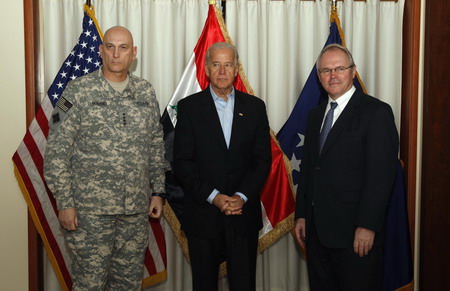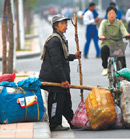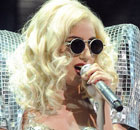Asia-Pacific
US vice president visits Iraq amid election row
(Agencies)
Updated: 2010-01-23 17:41
 |
Large Medium Small |
BAGHDAD: US Vice President Joe Biden held talks with Iraqi officials in Baghdad on Saturday amid a row over a decision to bar scores of candidates from a March election over suspected links to Saddam Hussein's Baath party.
|
 US Vice President Joe Biden (C) poses for the media with top US military commander in Iraq General Raymond Odierno (L) and US Ambassador Chris Hill at the US Embassy in Baghdad January 22, 2010. [Agencies] |
The move by an independent panel has outraged Sunnis who dominated Iraq for more than two decades under Saddam and who see it as an attempt to marginalise their community, casting doubt on the inclusiveness and legitimacy of the March 7 vote.
"I would say based on the recent months especially, that what we've seen is a growing and significant ability of Iraqis to resolve their differences and disputes through the political process," said Biden's national security adviser Antony Blinken.
"And so I don't think it's the place of the United States or any other outside country to resolve these kinds of problems for Iraqis because they are demonstrating they are more than capable of resolving it for themselves."
Blinken told reporters on Friday night "the proof will be in the pudding", but that he had some confidence the issue would be resolved.
The sectarian violence between minority Sunnis and majority Shi'ites unleashed by the 2003 US invasion has begun to fade.
But Iraq's security remains fragile, and is frequently put to the test by suicide bombings and killings carried out by suspected Sunni Islamist insurgents such as al Qaeda, or attacks US officials blame on Shi'ite militia supported by Iran.
The March election is a pivotal test of whether Iraq can sustain the growing peace and build a future of stability and prosperity on the back of multibillion-dollar deals the country has started to sign with global oil companies.
FUELING RESENTMENT
Sunnis largely boycotted the last national elections in 2005, feeding resentment and fuelling the insurgency against US troops and the Shi'ite-led government. That could happen again if Sunnis feel unfairly excluded from this election.
The list of 511 banned candidates actually included more Shi'ite politicians than Sunnis. It was weighted against secular groups expected to fare well in the election against the Shi'ite Islamist parties that have dominated Iraq since the invasion.
More of the 6,500 candidates in total standing in the election are expected to be banned for other reasons, such as for having criminal records or using fake university degrees.
Biden's first meeting on Saturday was with Shi'ite Prime Minister Nuri al-Maliki. He was then expected to meet with President Jalal Talabani, a Kurd.
Talabani said on Friday that there would be a meeting soon of Iraqi leaders to resolve the issue. His office has also asked a court to rule on the legal standing of the committee that drew up the list of candidates banned for their Baathist past.
Biden was asked by President Barack Obama to take the White House lead on Iraq policy.











